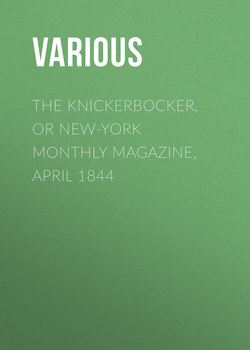The Knickerbocker, or New-York Monthly Magazine, April 1844

Реклама. ООО «ЛитРес», ИНН: 7719571260.
Оглавление
Various. The Knickerbocker, or New-York Monthly Magazine, April 1844
A PILGRIMAGE TO PENSHURST
ILLUSTRATIONS
IDYLL
IN IMITATION OF THEOCRITUS, BY WILLIAM CHIDDON
THE LEGEND OF DON RODERICK
NUMBER TWO
STANZAS TO E–
BELISARIUS
A VERITABLE GHOST STORY
RÊVES ET SOUVENIRS
I
II
III
IV
V
VI
VII
VIII
A FIRST NIGHT OF RACINE
FROM DE JOUY’S ‘HERMITE’ OF THE FOURTH OF JANUARY, EIGHTEEN HUNDRED AND TWELVE
STANZAS TO MARY
ON RIVERS AND OTHER THINGS
TO A CERTAIN BOUQUET
APOSTROPHE TO TIME
REMINISCENCES OF A DARTMOOR PRISONER
NUMBER TWO
FRAGMENTS FROM THE GREEK
AN ALLIGATORICAL SKETCH
NUMBER TWO OF LIFE IN FLORIDA
AN EPITAPH
THE CHURCH BELL
THE QUOD CORRESPONDENCE
Harry Harson
CHAPTER XXIV
CHAPTER TWENTY-FIVE
LITERARY NOTICES
EDITOR’S TABLE
OUR OLD MEETING-HOUSE
Отрывок из книги
Before the extension of commerce and manufactories in Europe, the hospitality of the rich and the great, from the sovereign down to the smallest baron, exceeded every thing which in the present times we can easily form a notion of. Westminster Hall was the dining-room of William Rufus, and might frequently perhaps not be too large for his company. It was reckoned a piece of magnificence in Thomas à Becket that he strewed the floor of his hall with clear hay or rushes in the season, in order that the knights and squires who could not get seats might not spoil their fine clothes when they sat down on the floor to eat their dinner. The great Earl of Warwick is said to have entertained every day, at his different manors, thirty thousand people; and though the number may have been exaggerated, it must however have been very great to admit of such exaggeration. The personal expenses of the great proprietors having gradually increased with the extension of commerce and manufactures, it was impossible that the number of their retainers should not as gradually diminish. Having sold their birth-right, not like Esau, for a mess of pottage in time of hunger and necessity, but in the wantonness of plenty for trinkets and baubles, fitter to be the play-things of children than the serious pursuits of men, they became as insignificant as any substantial burgher or tradesmen in a city.
The planta-genista or broom having been ordinarily used for strewing floors, became an emblem of humility, and was borne as such by Fulke, Earl of Anjou, grandfather of Henry II., King of England, in his pilgrimage to the Holy Land. The name of the royal house of Plantagenet is said to be derived from this circumstance.
.....
The Caliph was overjoyed with the contents of the letter. ‘God is great!’ exclaimed he, ‘and Mahomet is his prophet! It has been foretold by the ambassador of God, that his law should extend to the ultimate parts of the west, and be carried by the sword into new and unknown regions. Behold, another land is opened for the triumphs of the faithful! It is the will of Allah, and be his sovereign will obeyed!’ So the Caliph sent missives to Muza, authorizing him to undertake the conquest.
Upon this there was a great stir of preparation; and numerous vessels were assembled and equipped at Tangier, to convey the invading army across the Straits. Twelve thousand men were chosen for this expedition: most of them light Arabian troops, seasoned in warfare, and fitted for hardy and rapid enterprise. Among them were many horsemen, mounted on fleet Arabian steeds. The whole was put under the command of the veteran, Taric el Tuerto, or the one-eyed, in whom Muza reposed implicit confidence, as in a second self. Taric accepted the command with joy: his martial fire was roused at the idea of having such an army under his sole command, and such a country to overrun; and he secretly determined never to return unless victorious.
.....